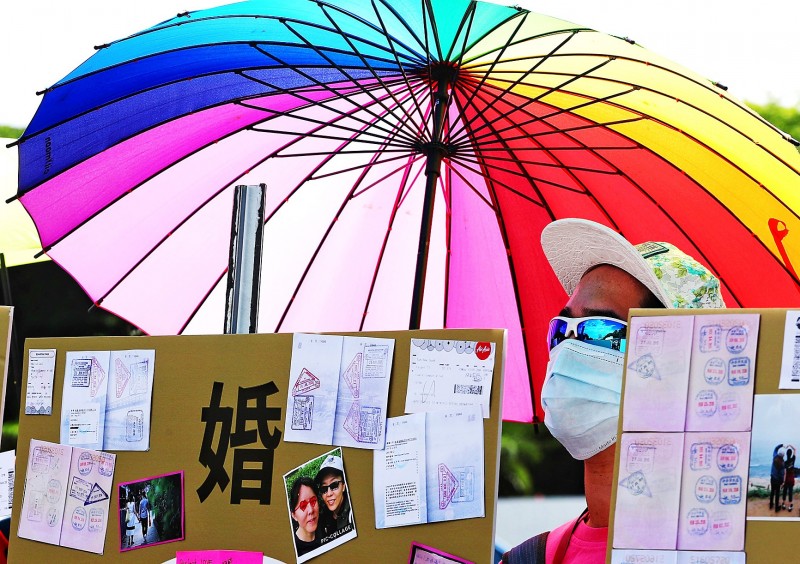《TAIPEI TIMES》 Same-sex laws need expanding: group

A member of the Taiwan Alliance to Promote Civil Partnership Rights stands outside the Presidential Office Building in Taipei yesterday. Photo: CNA
ONE YEAR LATER: TAPCPR called on the president to focus on having transnational same-sex marriages recognized after she begins her second term on Wednesday
By Shelley Shan / Staff reporter
The Taiwan Alliance to Promote Civil Partnership Rights (TAPCPR) yesterday urged President Tsai Ing-wen (蔡英文) to quickly complete the legal procedures required to recognize transnational same-sex marriage after she starts her second term tomorrow.
“We hope President Tsai can make this issue part of her key agenda after she starts her second term in office on May 20 and engage in administrative coordination of all government levels, so that the government can complete all required measures for the legalization of transnational same-sex marriage,” TAPCPR founder and executive director Victoria Hsu (許秀雯) told a news conference, one year after same-sex marriage was legalized.
Taiwan became the first Asian country to legalize same-sex marriage after the Legislative Yuan passed the Enforcement Act of Judicial Yuan Constitutional Interpretation No. 748 (司法院釋字第748號解釋施行法) on May 17 last year. However, some same-sex couples still cannot have their marriage recognized, as their spouses are not citizens of countries where same-sex marriage is legal.
Hsu said that the alliance has received official responses regarding this matter from the Ministry of Justice, the National Immigration Agency, the Department of Household Registration and the Mainland Affairs Council.
Officials from these agencies said that transnational same-sex marriage is an issue that needs to be addressed through interdepartmental communication and the amendment of laws, she said.
The alliance’s petition to have transnational same-sex marriage recognized has been endorsed by 20 human rights organizations worldwide, Hsu said.
Most of them were confident in Tsai’s ability to address the issue, saying that she achieved the most difficult task of legalizing same-sex marriage last year, Hsu said, adding that Tsai should not keep transnational same-sex couples waiting any longer.
Taiwanese Lai Kai-li (賴凱俐) and Malaysian Tan Bee-guat (陳美月), who have been unofficially married for five years, said that they have tried to stay together in Taiwan by applying for tourism and work visas for Tan. However, Tan eventually had to enroll in a university as a 35-year-old freshman to obtain a student visa.
A licensed tour guide, Tan said that she has not been able to find a job for the past few months because of the COVID-19 outbreak.
Fearing that she might have to leave the country after graduating, Tan has entered a master’s degree program in case she cannot secure a work visa.
“A majority of transnational same-sex couples have to live to in different countries and manage to keep in touch with each other via Webcast. To us, going to sleep with the Webcast on is what we do every day, not a scenario in a movie,” Tan said.
Tsai said on Facebook that same-sex couples seeking messages of congratulations from the Presidential Office can now choose to be addressed as newlyweds, rather than only bride and groom.
This small addition represents many more key changes to come, she said.
“It has been one year since the Enforcement Act of Judicial Yuan Constitutional Interpretation No. 748 was passed at the legislature. Through the law, everyone’s marriage rights can be equally protected. Values that everyone holds dear still exist, and more people can enjoy happiness,” Tsai said.
A recent Executive Yuan survey found that 53 percent of people said that same-sex couples should be allowed to legally marry, an increase of 15.1 percent compared with 2018, the Democratic Progressive Party said, adding that this shows that Taiwan is on its way to becoming a more open and diverse society.
The New Power Party said that it would continue to work on legalizing all transnational same-sex marriages, as it is a fundamental human right.
新聞來源:TAIPEI TIMES















